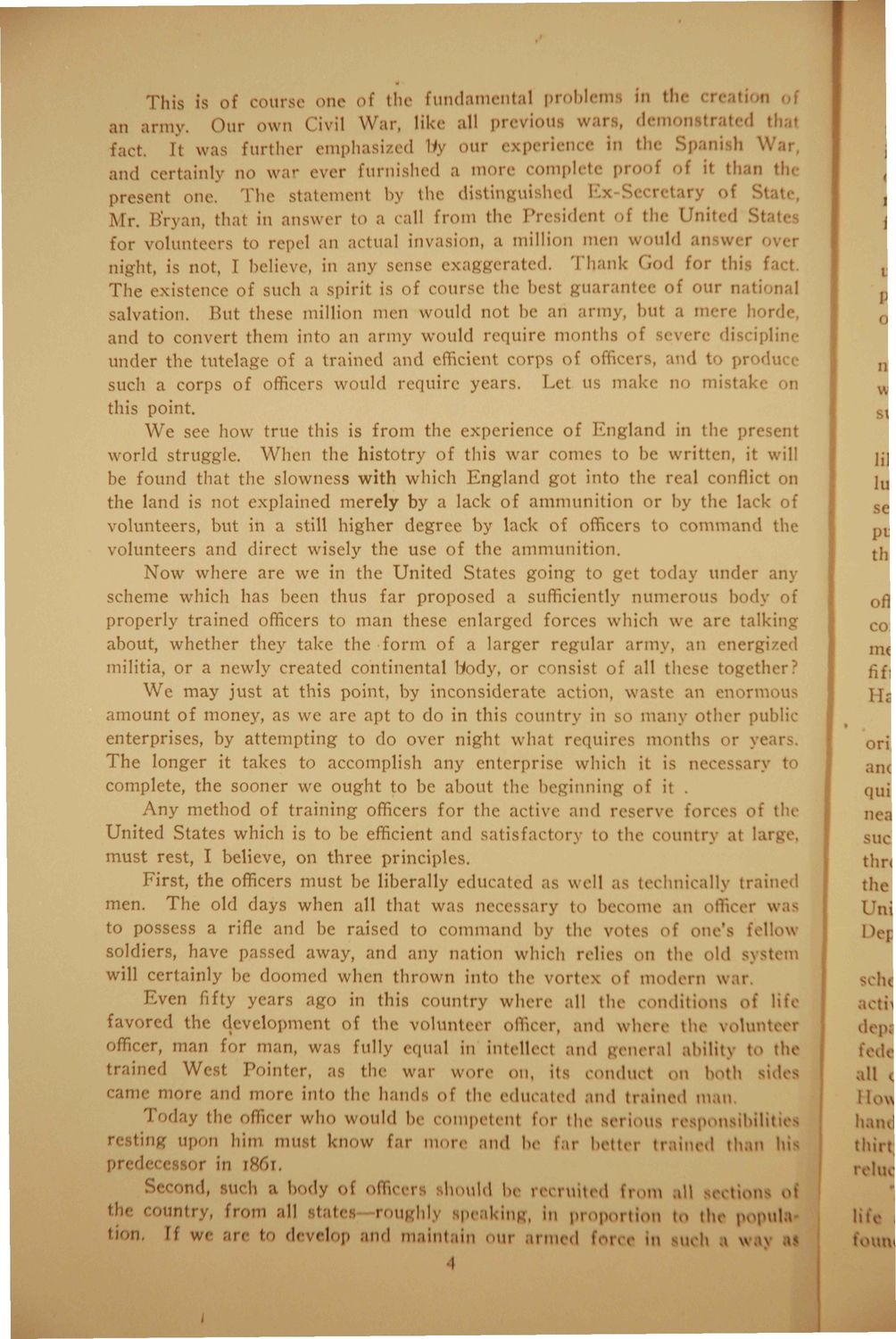| |
| |
Caption: Booklet - Military Training in our Land Grant Colleges (1916)
This is a reduced-resolution page image for fast online browsing.

EXTRACTED TEXT FROM PAGE:
This is of course one of the fundamental problem in the < r f an army. Our own Civil War, like all previous wars, demons! d th; fact, It was further emphasized tiy our ( perieni in the Sj h Wa: and certainly no war ever furnished a more complete proof of it than th 1 present one. The statement by the distinguished I'1 x - Secretary of S Mr. Bryan, that in answer to a eall from the President <.f the United S t a t for volunteers to repel an actual invasion, a million men would an$V r over night, is not, I believe, in any sense exaggerated. Thank God for this f The existence of such a spirit is of couv^c the best guaraim of > ir nat rial salvation. But these million men would not he an army, hut a mere hord* and to convert them into an army would require months of disciplin under the tutelage o\ a trained and efficient corps of officei and to produ such a corps of officers would require years. Let us make no mistake i this point. W e see how true this is from the experience of England in the present world struggle. When the histotry of this war comes to he written, it will be found that the slowness with which England got into the real conflict on the land is not explained merely by a lack of ammunition or by the lack of volunteers, but in a still higher degree by lack of officers to command the volunteers and direct wisely the use of the ammunition. Now where are we in the United States going to get today under any scheme which has been thus far proposed a sufficiently numerous body of properly trained officers to man these enlarged forces which we arc talkin about, whether they take the form of a larger regular army, an energized militia, or a newly created continental Hody, or < nsist of all these together W e may just at this point, by inconsiderate action, waste an enormou amount of money, as we are apt to do in this country in i many other publi enterprises, by attempting to do over night what requires months or y< T h e longer it takes to accomplish any enterprise which it is necessary to complete, the sooner we ought to be about the beginning of it . Any method of training officers for the active and reserve forces o\ the United States which is to be efficient and satisfactory to the country at large must rest, I believe, on three principles. First, the officers must be liberally educated as well as technically trained men. The old days when all that was necessary to become an officer was to possess a rifle and be raised to command by the votes ^^ one's fellow soldiers, have passed away, and any nation which relics on the old system will certainly be doomed when thrown into the vortex i^\ modern war. Even fifty years ago in this country where all the conditions of life favored the development of the volunteer officer, and where the volunteer fficer, man for man, was fully equal in intellect and general ability to the trained West Pointer, as the war wore on. its conduct on both sides ame more and more into the hands of the educated and trained n u n Today the officer who would be competent for the i< ioui n iponsibiliti< n ting upon him must know far more and be pred -r in iH6r. r better ti.lined than In Second, such a body of officers should be n ruited front all tli'- country, from all |tat< roughly speaking in proportion to (he populll tion, If wc are to develop and maintain 0U1 aim I foi 6 m \\ a w.iv •I
| |